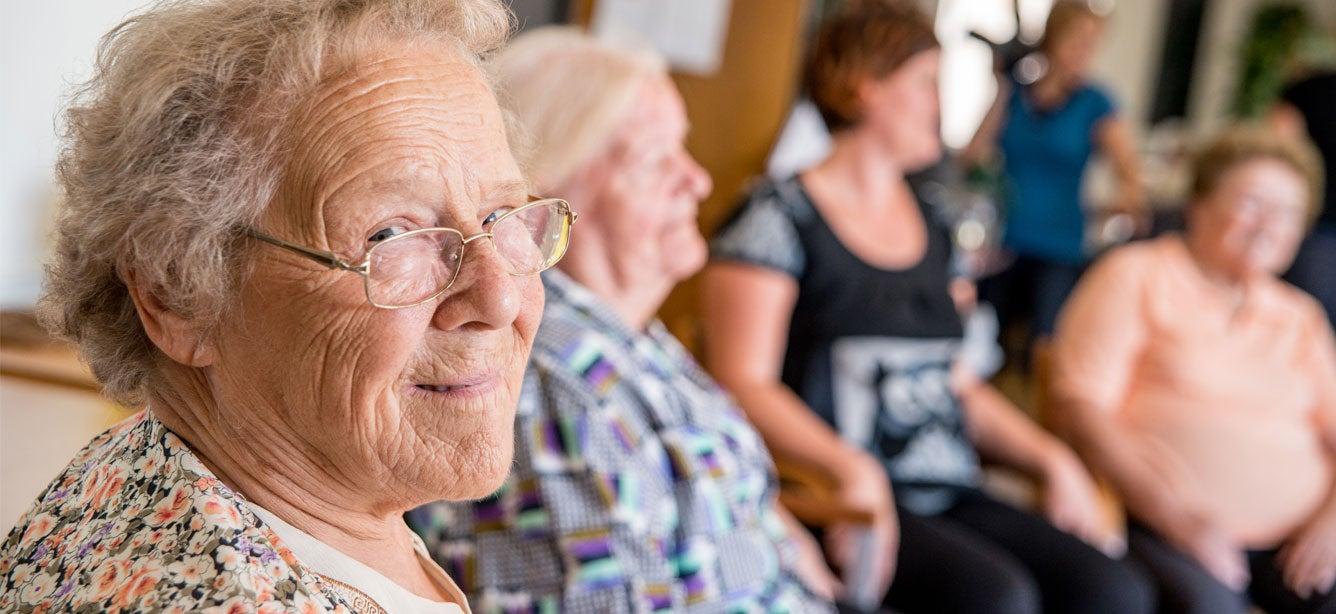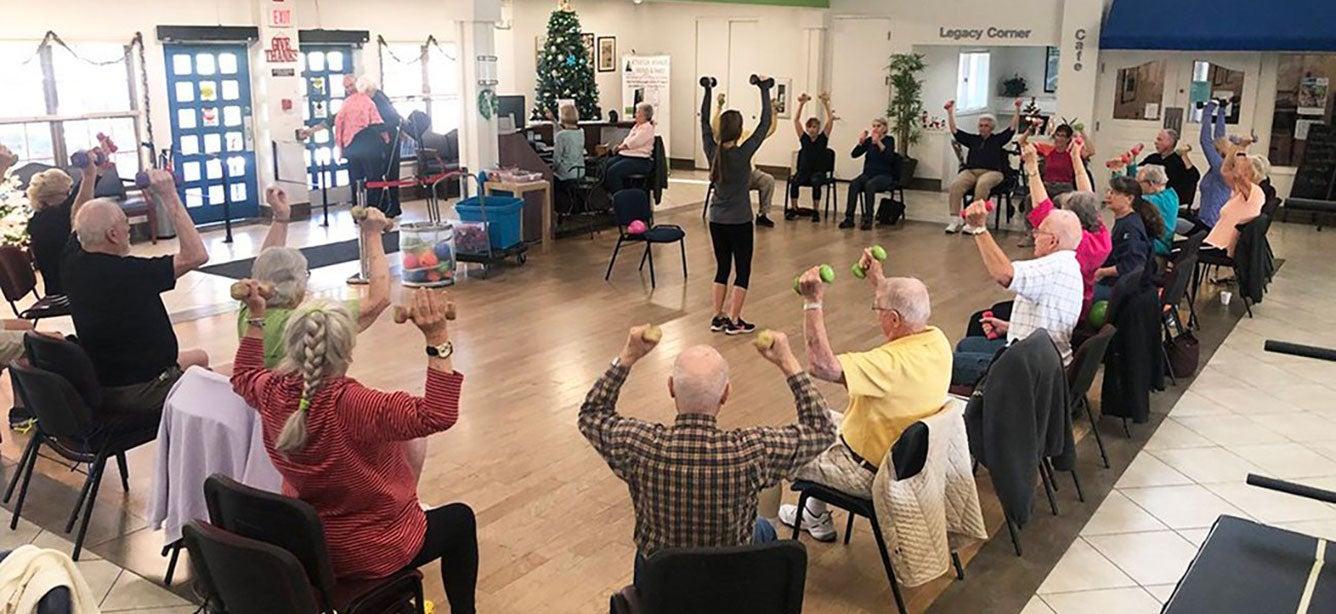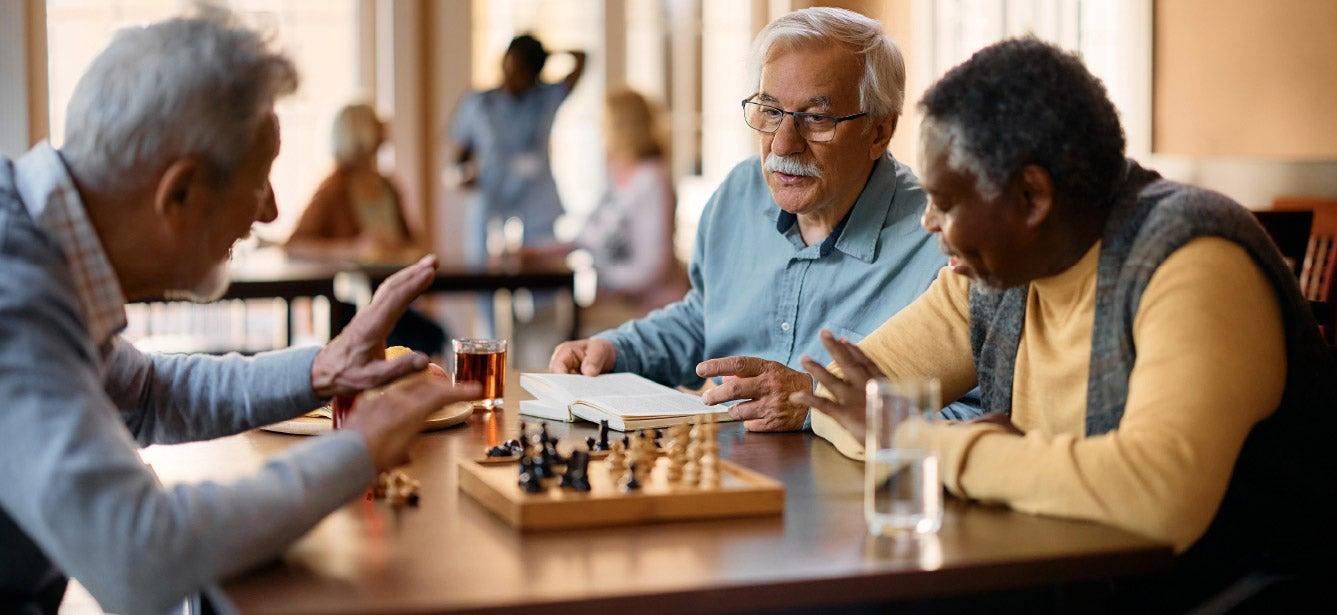
In 1978, NISC developed national standards for the senior center field. They have been revised four times, most recently in 2010. These standards serve as a guide for those interested in developing a senior center and as a guide for existing centers. Each standard has a principle, rationale, and detailed criteria section. They serve as the basis for the self-assessment workbook. Below is an overview of the principles of the National Senior Center Standards.
Standard 1: Purpose
PRINCIPLE: A senior center shall have a written statement of its mission consistent with the senior center philosophy. It shall also have a written statement of its goals and objectives based on its mission and on the needs and interests of older adults in its community or service area. A senior center shall have written action plans that describe how its program will achieve goals and objectives. These statements shall be used to guide the character and direction of the senior center's operation and program.
Oliver Wendell Homes once said, "I find the great thing in this world is not so much where we stand, as in what direction we are moving. To reach the port of heaven, we must sail sometimes with the wind and sometimes against it, but we must sail, and not drift nor lie at anchor."
Working together with community leaders, a senior center must define its purpose. Without this, there is no foundation of what you stand for, the principles upon which you stand, nor for where you intend to go in the future.
The primary way to define your purpose is to develop a mission statement. Your mission should be consistent with your philosophy as a center.
Separate from the mission statement should be identified goals and objectives, and an action plan describing how these goals and objectives will be accomplished.
With these things established, you have the framework for communicating who you are in your community. Knowing purpose gives direction to staff, volunteers, board members, and participants as to where you are heading. In this effort, find meaningful ways to be inclusive of center participants, volunteers, governing members, staff, community organizations, funding agencies, and even businesses with which you work.
Thinking and talking with others can help assure that the senior center's plans are realistic and appropriate, and have support in action. Broad involvement of the community helps connect the community to the senior center and to build new partnerships.
Condensed from National Senior Center Standards by Bonni Walker NISC Delegate, NV NISC
Standard 2: Community
PRINCIPLE: A senior center shall participate in cooperative community planning, establish service delivery arrangements with other community agencies and organizations, and serve as a focal point in the community. A senior center shall be a source of public information, community education, advocacy, and opportunities for older adults.
As community focal points, senior centers act as a resource for the entire community. In addition to providing services and activities for older adults, they link participants with resources offered by other agencies. Through community linkages, the senior center plays a leadership role in developing innovative approaches to address aging issues in the community.
By establishing relationships with other service providers, the senior center helps make the service system more responsive to older adults:
- Assess your senior center's involvement in community planning with other community agencies and organizations.
- Identify agencies, organizations, and individual providers who offer services to older adults in your community.
- Make arrangements with them for mutual referrals and cooperative service provision. Create written agreements that clarify roles.
When appropriate, encourage providers to deliver their services at the senior center in order to make their services more accessible to the community's older population. Or, arrange for the senior center to use the facilities of other organizations to provide services.
As a focal point and advocate for older adults, the senior center must provide information to the community and center participants about its programs and about aging issues. Developing and using a marketing plan is the best way to accomplish this and help promote a positive understanding of aging in the community.
As part of their role in the community, senior centers provide field training and educational opportunities for interns in the aging field. To the extent practical and ethical, senior centers conduct or take part in research that advances knowledge about senior centers and aging.
Condensed from National Senior Center Standards by Ann Lund NISC Delegate, CO
Standard 3: Governance
PRINCIPLE: A senior center shall be organized to create effective relationships among participants, staff, governing structure, and the community in order to achieve its mission and goals. The organizational structure of a senior center is vital to its success.
Effective relationships among the various levels of the organization allow the senior center to carry out its mission, goals, and objectives. Communication between sponsoring agencies, administration, volunteers, and center members assures that all are in agreement with regard to direction and plans.
Participant involvement is basic and allows the integrity that ensures a course of action that is responsive to the most important element--those who are served. Governing documents should reflect clarity of vision in simple, easy-to-understand language and must be reviewed regularly.
Using these documents, the advisory boards can perform a variety of roles from advice to feedback. Management needs to be receptive to counsel and open for advice. Standards and policies facilitate uniformity and fairness--important elements when dealing with a variety of personalities.
Condensed from National Senior Center Standards by Sr. Mary Dolores Jablonski NISC Delegate, PA
Standard 4: Administration and Human Resources
PRINCIPLE: A senior center shall have clear administrative and human resources policies and procedures that contribute to the effective management of its operation. It shall be staffed by qualified personnel--paid and volunteer--capable of implementing its program.
"It starts from the top" is a common saying with which we are all familiar, and seems to be appropriate when talking about administration.
In order to efficiently and effectively run a senior center, a qualified administrator is responsible for day-to-day senior center management. This person is the "backbone" to the organization and carries much of the responsibility for delegation of tasks, accountability to governing structures, keeping lines of communication open within the center and the community, handling budget concerns, emergency arrangements, staff, and program development.
Fair human resources policies and practices enhance staff morale and promote positive cooperative effort. Clear job descriptions allow staff and volunteers to understand job expectations and boundaries. Training and educational opportunities allow staff and volunteers to experience personal growth, and to develop professional skills needed to carry out the goals, objectives, and philosophy of the center.
Condensed from National Senior Center Standards By Bonni Walker, LSW, GCM NISC Delegate, NV
Standard 5: Program Planning
PRINCIPLE: A senior center shall provide a broad range of group and individual activities and services that respond to the needs and interests of older adults, families, and caregivers in its community or service area. Program planning evolves from reflection on your mission. What business are we in, where are we going, and how are we going to get there?
Programs are the strategies that carry out your goals and objectives. Many questions need to be answered before implementing programs to make certain that programs are relevant: Who is the population to be served? What changes have taken place in the demographics of my community to which we need to respond? What are the trends in our field that hold true across geographic regions? What programs are dying, what interests are emerging?
Examine the suggestions and needs expressed by the participants and other stakeholders, such as family members, staff, volunteers, businesses, and community agencies. Consider what strategies are feasible and what the priorities are. What resources are available or can be garnered to address the needs? A well-thought-out plan often attracts resources.
Today's seniors span several generations, creating a wide range of physical, cognitive, cultural, and geographical aspects to consider. Program implementation may involve not only planning programs at your center but in a variety of settings to reach different audiences. Activities and services shall promote personal growth and respond to individual differences. Outreach and marketing are integral parts of your programming.
When all these elements come together, a cohesive meaningful program will emerge.
Condensed from National Senior Center Standards by Barbara Karro NISC Delegate, VA
Standard 6: Evaluation
PRINCIPLE: A senior center shall have appropriate and adequate arrangements to evaluate and report on its operation and program. Through the self-assessment process, a senior center looks at its ways of work.
One of the steps in the self-assessment process is evaluation. In the evaluation section one looks at methods of evaluation, what areas are evaluated, who is responsible, and how the information is used. The evaluation may be used to measure accomplishments or to uncover program or operational problems. It is part of a planning cycle. It may be an overall assessment of the center's operation or an examination of one aspect of its program. For example, an evaluation could measure participants' satisfaction with a service or activity.
Evaluations can be quantitative (number of people served, service units provided) or qualitative (the impact of the program on the people it serves). More and more, evaluations are called upon to have outcome measures—what quantitative and qualitative difference did the program make?
The senior center's administrator and its governing structure are responsible for ensuring evaluations are done on a regular basis, that appropriate individuals are involved, and that a report is prepared with information from the evaluation. A committee could be formed to perform periodic formal or informal evaluations. Occasionally, an outside evaluation consultant may be used.
Make it your New Year's resolution to evaluate one program a month. You and the members of your center will be glad you did.
Condensed from National Senior Center Standards by K. Jean Williams NISC Delegate, DE
Standard 7: Fiscal Management
PRINCIPLE: A senior center shall practice sound fiscal planning and management, financial record keeping, and reporting. Because of the multiple streams of funding, fiscal management can be complex and arduous. However, the lifeblood of the senior center is highly dependent on sound fiscal planning and management, fiscal record keeping, and reporting.
Oftentimes, a professional is designated to track funds and to help the administrator and governing structure keep track of the center's budgetary needs. Senior centers' financial operations should conform to all applicable legal and administrative requirements. Senior centers must meet community expectations that its funds are properly and efficiently used.
Condensed from National Senior Center Standards by Constance Todd NISC Director
Standard 8: Records and Reports
PRINCIPLE: A senior center shall keep complete records required to operate, plan, and review its program. It shall regularly prepare and circulate reports to inform its governing structure, its participants, staff, funders, public officials, and the general public about all aspects of its operation and program.
Accurate record keeping and reports are essential for the management of a senior center. Participant, program, and administrative records are instruments used to identify who uses the center, the scope of activities and services offered by the center, and to help in the management of the center's operation.
All records are to be reviewed regularly by designated staff for evaluation and continued appropriateness. Because of the content of these records and reports, it is imperative that they are kept confidential. Confidential procedures must include a system for secure storage, limiting access to others, protection of clients, and a release of information system.
Condensed from National Senior Center Standards by Bonni Walker, LSW, GCM NISC Delegate, NV
Standard 9: Facility
PRINCIPLE: A senior center shall make use of facilities that promote effective program operation and that provide for the health, safety, and comfort of participants, staff, and community.
Have you ever wished you could look at your building with an unbiased eye? See the rooms as a stranger sees them? This is the opportunity you will have when you do the self-assessment and work on standard nine. A panel from the community, serving as the self-assessment committee, can become the unbiased eyes.
The standards, as established by National Institute of Senior Centers, become a guide by which to measure your center. The Self-Assessment Committee will look at the location and accessibility of the center and at its design, equipment, and furnishings.
A very important aspect of a senior center is the safety of the building. A committee from outside the center may raise questions you have not thought about or were apprehensive about asking.
Many times, committee members will bring items to the attention of your Board of Directors more effectively than you can. Educating a board of directors about the needs of the center is one of the benefits of doing the self-assessment. So rather than seeing it as a report card grading you, view it as an opportunity to get that new sign, the additional space, or even a new building you have been wanting.
Condensed from National Senior Center Standards by K. Jean Williams NISC Delegate, DE


